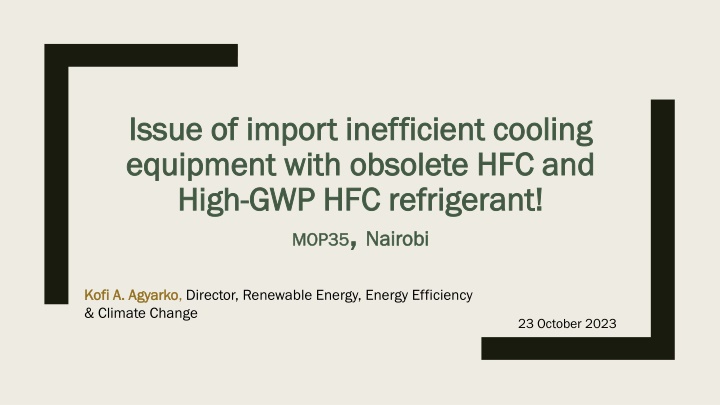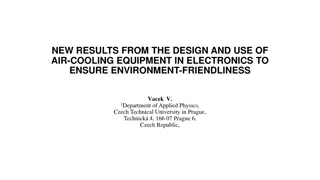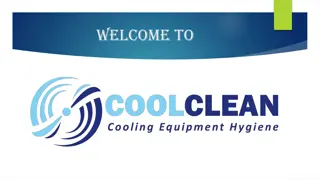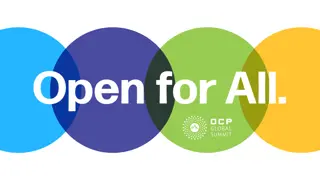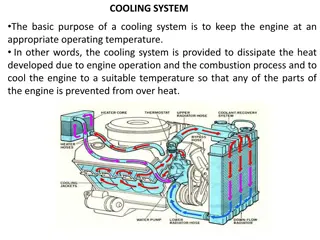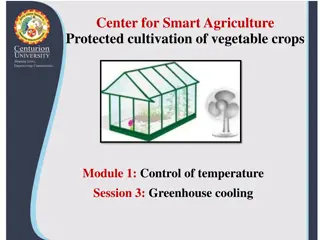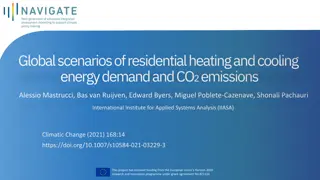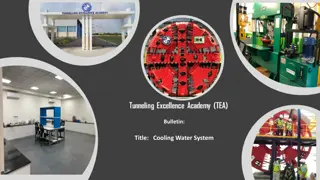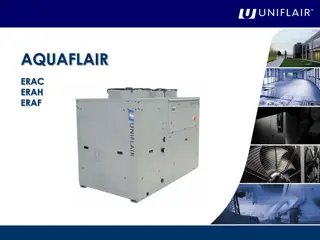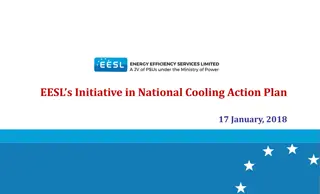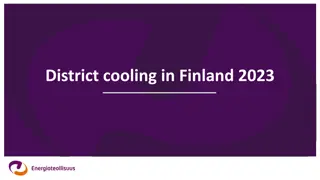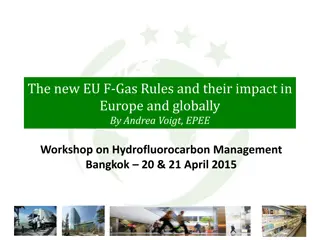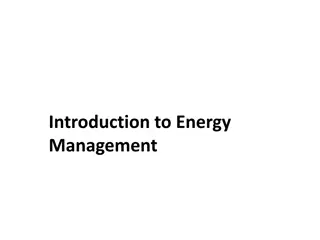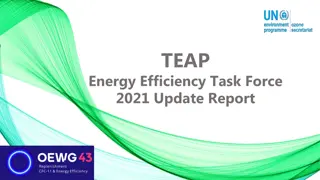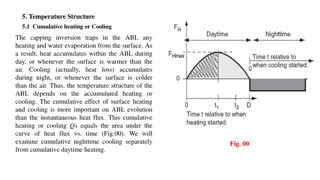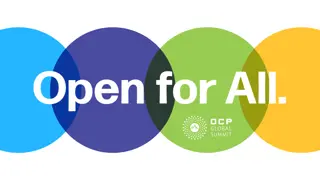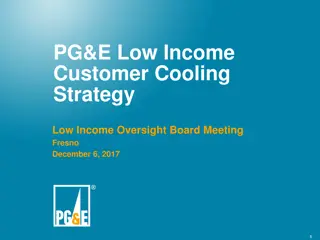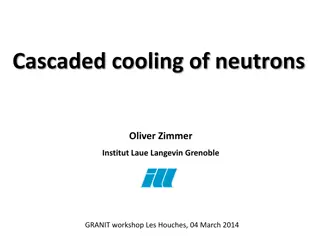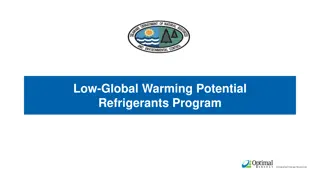Environmental Impact of Inefficient Cooling Equipment and Obsolete Refrigerants in Africa
The issue of importing inefficient cooling equipment with obsolete, high-GWP HFC refrigerants poses a significant environmental threat in Africa. Dumping new appliances with outdated refrigerants leads to wasted resources, air pollution, and climate change. This practice hinders Africa's development, perpetuates poverty, and disrupts the power grid. Global cooperation is needed to address this harmful trend and protect the environment.
Download Presentation

Please find below an Image/Link to download the presentation.
The content on the website is provided AS IS for your information and personal use only. It may not be sold, licensed, or shared on other websites without obtaining consent from the author.If you encounter any issues during the download, it is possible that the publisher has removed the file from their server.
You are allowed to download the files provided on this website for personal or commercial use, subject to the condition that they are used lawfully. All files are the property of their respective owners.
The content on the website is provided AS IS for your information and personal use only. It may not be sold, licensed, or shared on other websites without obtaining consent from the author.
E N D
Presentation Transcript
Issue of import inefficient cooling Issue of import inefficient cooling equipment with obsolete HFC and equipment with obsolete HFC and High High- -GWP HFC refrigerant! GWP HFC refrigerant! MOP35, , Nairobi Nairobi MOP35 Kofi A. Agyarko Kofi A. Agyarko, Director, Renewable Energy, Energy Efficiency & Climate Change 23 October 2023
The Ugly Face of Dumping NEW APPLIANCES! APPLIANCES! NEW Why new inefficient new inefficient appliances with obsolete refrigerants wasting precious money on electricity and service with air pollution and climate change from greenhouse gas and toxic fossil fuel emissions? How can global companies and their home countries hope to be respected when they exploit export markets with products they would not sell to their own citizens? Why not global cooperation to stop shipping of products so easily identified as damaging to local prosperity and global environment? obsolete refrigerants dumped in Africa Please work with Africa to end this dumping madness! 3
Environmentally Harmful Dumping of Inefficient and Obsolete Air Conditioners in Africa Non Non- -African African Company Company 26% 26% Brand Unidentified; Brand Unidentified; Assembled in Africa Assembled in Africa 27% 27% African AC markets dominated by low-efficiency equipment using obsolete refrigerants Used and defective products are exported from the European Union and Asia to Africa Imported Imported 26% 26% Local Subsidiary of Local Subsidiary of Non Non- -African African Company Company 6% 6% Assembled in Assembled in Africa Africa 74% 74% African African Company Company 18% 18% African African Company/Non Company/Non- - African company JV African company JV 23% 23% Origins of low efficiency RACs sold in 10 African countries (N=651,273). Source: CLASP/IGSD, Environmentally Harmful Dumping of Inefficient and Obsolete Air Conditioners in Africa (2020). 4
The Harmful Effects of Environmental Dumping Triggers the poverty spiral keeps users in perpetual poverty because of high running cost. Increasing dependence on obsolete refrigerants that increasingly becoming expensive and unavailable Flooding the market with poor quality equipment chases away quality products market for lemons stresses the grid, transformer overloads resulting in black outs and brown outs Increases non-recyclable refuse Hampers efforts to meet international obligations. 5
Africa is leading efforts to raise Africa is leading efforts to raise awareness of, identify solutions, call awareness of, identify solutions, call partners to action, and stop partners to action, and stop environmental dumping environmental dumping 6
First energy efficiency decision energy efficiency decision adopted immediately after the Kigali Amendment was agreed (introduced by Rwanda & Morocco), sought to implement anti-dumping measures (Oct. 2016) At the side event At the side event Stopping Environmental Dumping at the 30 Meeting of the Parties to the Montreal Meeting of the Parties to the Montreal Protocol Protocol (Nov. 2018), Rwanda drew attention to the problems caused by the dumping of obsolete and inefficient equipment in African markets, which undermined climate efforts by African countries. At the side event At the side event Stop Environmental Dumping: Latest Analysis and Tools at the Combined 12th Meeting of the Combined 12th Meeting of the Conference of the Parties to the Conference of the Parties to the Vienna Convention and 32 Vienna Convention and 32nd of the Parties to the Montreal Protocol of the Parties to the Montreal Protocol (Nov. 2020), Ghana presented its experiences battling an ever-rising tide of obsolete cooling appliance imports. 30th th nd Meeting Meeting Anti-dumping included in African Ministerial Conference on the Environment Conference on the Environment (AMCEN) Decision 17/1 Decision 17/1 (Nov. 2019) (among other Decisions) African Ministerial (AMCEN) 7
15 15th th Session of the AMCEN (Egypt, 2015) Session of the AMCEN (Egypt, 2015) Resulted in Cairo Declaration, which solidified and unified African support for an HFC amendment under the Montreal Protocol 16 16th th Session of the AMCEN (Libreville, 2017) Session of the AMCEN (Libreville, 2017) Resulted in Libreville Declaration, which welcomed and pledged support for the Kigali Amendment 17 17th th Session of the AMCEN (Durban, 2019) Session of the AMCEN (Durban, 2019) Decision 17/1: Urged Parties of the Montreal Protocol to adopt an action plan to prevent market Decision 17/1: Urged Parties of the Montreal Protocol to adopt an action plan to prevent market penetration of obsolete equipment while facilitating access to secure energy penetration of obsolete equipment while facilitating access to secure energy- -efficient technologies. Also urged African states which have not yet ratified the Kigali Amendment to ratify and implement it as soon as possible. Decision 17/2: Emphasized the benefits of improving air quality, including through managing, and as nationally appropriate reducing short-lived climate pollutants efficient technologies. 19 19th th Ordinary Session of the AMCEN (Durban, 2019) Ordinary Session of the AMCEN (Durban, 2019) Again resulted in a decision to urge Parties to the Montreal Protocol to adopt an action plan to prevent Again resulted in a decision to urge Parties to the Montreal Protocol to adopt an action plan to prevent market penetration of obsolete equipment in Africa market penetration of obsolete equipment in Africa Extraordinary Meeting of the AMCEN (Virtual, 2020) Extraordinary Meeting of the AMCEN (Virtual, 2020) Agreed to include in the African Green Stimulus Program: To urge Parties to the Montreal Protocol to adopt an action plan preventing To urge Parties to the Montreal Protocol to adopt an action plan preventing the market penetration of obsolete equipment in Africa while facilitating the market penetration of obsolete equipment in Africa while facilitating access to secure and energy access to secure and energy- -efficient technologies on the continent. efficient technologies on the continent. 8
Low volume consuming countries that are technology takers (importing only) Low volume consuming countries that are technology takers (importing only) have the greatest potential to benefit from capacity building to implement have the greatest potential to benefit from capacity building to implement policies to avoid risks associated with environmental dumping of inefficient policies to avoid risks associated with environmental dumping of inefficient technologies and obsolete refrigerants technologies and obsolete refrigerants. Montreal Protocol Technology and Economic Assessment Panel (TEAP), Energy Efficiency Task Force Report. 9
Examples of African Support for Stop Dumping Efforts Examples of African Support for Stop Dumping Efforts Preventing the dumping of inefficient RAC equipment into Africa will assist the continent to contribute to the goals of the Kigali Amendment and promote the use of EE equipment. Engr. Idris A.I, Asst Director, Nigeria National Ozone Officer, Federal Ministry of Environment Many thanks for this initiative, which is great, and may help our continent and I hope, we may find a way, to protect our market. Samuel Par , Burkina Faso National Ozone Unit Coordinator, Ministry of Environment, Green Economy and Climate Change The National Ozone Unit in Libya asserts you its full support We are very keen to protect our environment from dumping with the mutual equipment that damage our natural environment. Dr. Khalifa Elawej, Director, Libya National Ozone Unit, Environment General Authority Our African Market should really be protected from dumping of obsolete technologies. M. Kirui, Kenya National Ozone Unit Coordinator, Ministry of Environment, Natural Resources and Regional Development Authorities [This allows us] to settle a process in order to curb the scourge of importing obsolete equipment and old discarded equipment. Vid m Am h Djossou, Togo National Ozone Coordinator, Ministry of Environment and Forest Resources 10
Clarion call to ACTION Ghana, on behalf of Africa, welcomes importing Ghana, on behalf of Africa, welcomes importing- - and exporting stakeholder: stakeholder: Help in championing our efforts within the Montreal Protocol to help us stop environmental dumping Manufacture and marketing in Africa of next-generation, energy-efficient and lower-global warming potential cooling appliances Technical and legal support in halting the environmental injustices arising from environmental dumping and recovering compensatory and punitive damages. Technological and trade support that will stop brain drain; attract investment and give hope to the future generation and exporting- -country country 11
GIVE ME HOPE TO LIVE GIVE ME HOPE TO LIVE Thanks Thanks Asante sana Asante sana Danke Danke Merci Merci Takk Takk Shukran Shukran Aseda Aseda oshe oshe 12
Selected Bibliography New New case authors in The Importance of Stopping Dumping in Ghana: The Case of Inefficient New and Used Cooling Appliances with Obsolete Refrigerants, (forthcoming, Duke Environmental Law & Policy Forum, Fall 2021). case studies studies on on environmental environmental dumping dumping and and related related solutions solutions are are underway underway. . Ghana energy officials are lead Environmental Environmental dumping Opoku & R. Van Buskirk (2020) Removing Barriers and Promoting Demand-Side Energy Efficiency in Households in Sub- Saharan Africa: A Case Study in Ghana, ENERGY POLICY 137: p. 3 ( In Market for lemons, Akerlof describes how when a market does not provide consumers reliable information regarding product quality, then the dynamics of the market causes a flood of cheaper, more profitable low-quality products that force higher quality products out of the market. Because of the inability of consumers to reliably identify higher quality products, sellers of high-quality products are unable to make profitable sales and the higher quality products disappear https://doi.org/10.1016/j.enpol.2019.111149 dumping inhibits inhibits the the market market for for higher higher- -quality, quality, energy energy efficient efficient cooling cooling products products. . K.A. Agyarko, R. from the market. ), available at: Environmental Environmental dumping treaty treaty obligations obligations. . Centre for Energy, Environment, and Sustainable Development (2020) Domestic Refrigerating Appliance and Room Air Conditioner Market and Feasibility Assessment: ECOWAS Refrigerators and ACs Initiative (ECOFRIDGES) in Ghana, p. 2 ( over 2 million inefficient refrigeration appliances are used in households in Ghana, presenting economic cost that runs into hundreds of millions of dollars in electricity bills to the national economy while resulting in increased carbon footprint of the country (each inefficient appliance generates over 0.7 tons of carbon emissions annually. On the other hand, the annual energy consumption of ACs range between 1,532 to 2,680 kWh/yr, depending on the cooling capacity (GIZ 2018). Furthermore, most of the old refrigerators and ACs use environmentally harmful refrigerants that are released into the atmosphere, especially in cases when they are improperly discarded. At least 2 tons of ozone-depleting substances are released into the atmosphere through this phenomenon. ), https://doi.org/10.1016/j.enpol.2019.111149, citing S. Gyamfi, F.A. Diawu, E.N. Kumi, F. Sika & M. Modjinou (2017) The energy efficiency situation in Ghana, RENEWABLE AND SUSTAINABLE ENERGY REVIEWS 82: 1415 1423 (no link available) and GIZ Green Cooling Initiative (2018) Ghana s Greenhouse Gas Inventory and Technology Gap Analysis for the Refrigeration and Air Conditioning Sector, https://www.green-cooling- initiative.org/fileadmin/Publications/2018_GCI_Inventory_Report_Ghana.pdf dumping increases increases Ghana s Ghana s carbon carbon footprint footprint and and makes makes it it more more difficult difficult to to fulfill fulfill environmental environmental 13
Research Research has countries countries in in 2018 standards standards and greenhouse greenhouse gases Environmentally Harmful Dumping of Inefficient and Obsolete Air Conditioners in Africa (24 June 2020), available at: https://www.clasp.ngo/research/all/environmentally-harmful-dumping-of-inefficient-and-obsolete-air-conditioners-in-africa/ has also 2018, , 170 and almost almost all gases scheduled scheduled for also documented documented that, 170, ,000 000 were all contained that, of of 650 were imported imported products contained obsolete obsolete refrigerants for phase phase out out and and phasedown 650, ,000 products that 000 new, new, low that did refrigerants that phasedown under low efficiency efficiency air did not not meet that are under the air conditioners conditioners sold meet the the minimum minimum energy are powerful powerful ozone the Montreal Montreal Protocol sold in in 10 energy efficiency efficiency ozone- -depleting depleting and Protocol. . CLASP and IGSD, 10 African African and The International International Energy Report: Benefits of cooling efficiency and the Kigali Amendment (July 2020) recognizes that [e] environmental environmental dumping dumping campaigns campaigns https://wedocs.unep.org/bitstream/handle/20.500.11822/33094/CoolRep.pdf?sequence=1&isAllowed=y Energy Agency Agency and and UN UN Environment Environment Programme Programme Cooling Emissions and Policy Synthesis [e]ffective ffective anti markets markets. . anti- - can can help help transform transform The Intergovernmental Intergovernmental Panel Warming of 1.5 C that policy resources resources development development. . https://www.ipcc.ch/site/assets/uploads/sites/2/2019/05/SR15_SPM_version_report_LR.pdf Panel on policy tools, secure secure on Climate Climate Change tools, (which (which include Change (IPCC) include tools equity equity (IPCC) has also recognized in its Special Report on Global tools to to stop stop environmental environmental dumping), of of transition transition dumping), can to to can help climate climate- -resilient help mobilize mobilize resilient to to The The export export of of refrigeration or or that that is is unusable unusable in in the air conditioning equipment includes: 1) export of technology that cannot legally be sold in the country of export as a consequence of failure to meet environmental, safety, energy efficiency, or other product standards; and 2) export of technology that is unusable in the country of export because refrigerants are no longer available because of national regulation or phaseout and phasedown control schedules under the Montreal Protocol. https://delpf.law.duke.edu/article/defining-the- legal-and-policy-framework-to-stop-the-dumping-of-environmentally-harmful-products-andersen-vol29-iss1/ refrigeration and the country and air country of of export, air conditioning conditioning equipment export, is is environmental equipment that environmental dumping that cannot cannot be dumping. . Environmental dumping of refrigeration and be legally legally sold sold in in the the country country of of export, export, See also P. Fleming, A Flood of Polluting Air Conditioners Hampers Africa s Climate Efforts, Yale360, September 9, 2020. https://e360.yale.edu/features/a-flood-of-polluting-air-conditioners-hampers-africas-climate-efforts 14
Environmental Dumping Defined Environmentally Harmful Dumping is the practice of exporting products to another country or territory that: 1. Contain hazardous substances, 2. Have environmental performance lower than is in the interest of consumers or that is contrary to the interests of the local and global commons, and/or 3. Can undermine the ability of the importing country to fulfill international environmental treaty commitments Environmentally harmful product dumping includes export of technology that cannot legally be sold in the country of export as a consequence of failing to meet environmental, safety, energy efficiency, or other product standards 16
1st Sustainability Step: Stop Dumping Forcefully apply legal tools consistent with international trade law to stop dumping of obsolete and inefficient appliances in all of Africa Meticulously build the legal foundation for increasingly stringent punishment and retribution for environmental dumping Strengthen capacity for investigation and monitoring of all activities that may involve environmental dumping 17
2nd Sustainability Step: Market Transformation Aggregate markets with Buyers Clubs and Bulk Procurement for affordable ownership of high-efficiency appliances Train and enforce proper installation and service for life-cycle energy efficiency Replace of older appliances that were inefficient when purchased, contain ozone-depleting and greenhouse gas refrigerants, and were improperly installed and maintained for energy efficiency Transition from fossil fuel to clean renewable hydropower, solar, and wind energy 18
3rd Sustainability Step Super-efficient appliances with sustainable refrigerants optimized for each climate: Best available technology designed and manufactured in Africa for value-added jobs and economic development Powered by clean energy sources Money saved on electricity spent locally for health, nutrition, education, entertainment, and other purchases contributing to quality of life and community strengthening Centers of engineering, legal, and economic excellence making the most of the natural capital of Africa and its people 19
